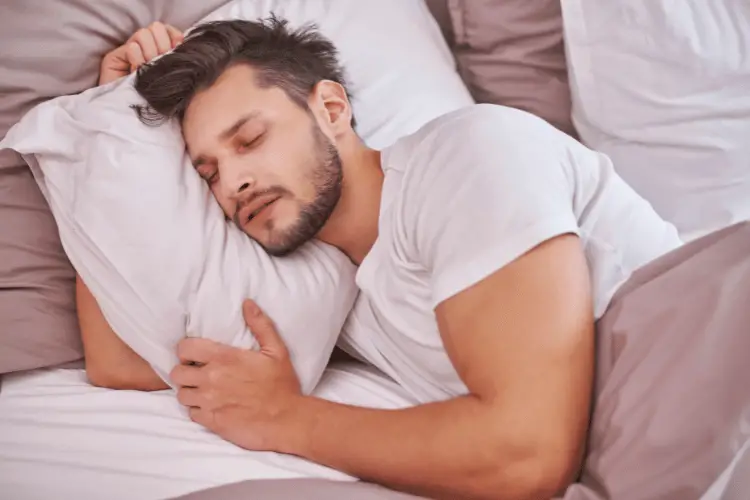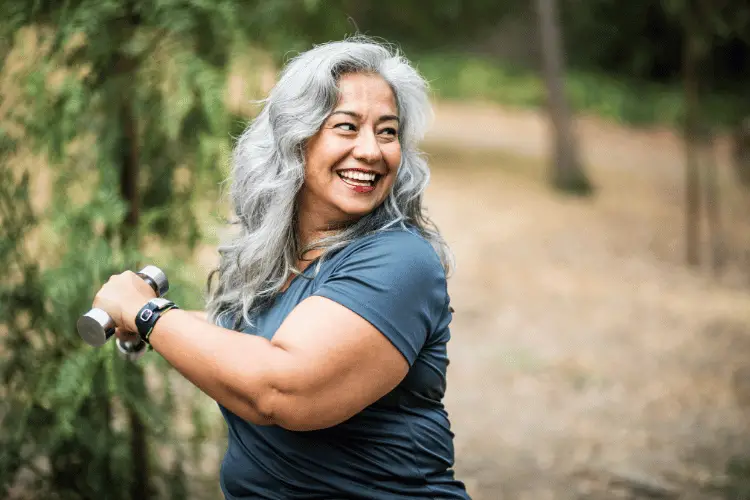Whenever I start a session with a client, I ask them one important question: what’s your purpose for training?
Sometimes people can lose sight of why they started exercising in the first place.
A goal and a purpose are two completely different concepts. A goal is about action, whereas purpose is about being—a long-term vision for your life. Your purpose isn’t to be “great” at weight-lifting, for example; it’s to become strong enough to do the things you love as often as you want for as long as possible.
To help you find your purpose for exercising, I’ve listed some of the most common whys of being physically active. From sleeping better to living longer, no purpose is too big or small.
- To Sleep Better
Dozens of studies prove that exercise is better than none for sleeping. It’s a natural sleep medication, one that helps you sleep better and fix your biological clock.
Exercise increases the time we spend in deep sleep, which is vital for muscle recovery, hormonal balance, immune functions, and memory processing.
Physical activity also raises the body’s adenosine levels, the neurotransmitter responsible for regulating your sleep-wake cycle. It acts as a homeostatic regulator of sleep, promoting muscle relaxation and tiredness.
So if you have trouble falling asleep, engage in at least 30 minutes of moderate aerobic exercise a couple of hours before bed. You’ll notice a significant improvement in sleep patterns within only a few weeks.

- To Be a Better Parent
Exercise helps you become a happier, healthier individual, which benefits everyone around you—especially your kids. You’ll have much more energy to spend with your little ones and have no trouble keeping up with their demands.
Exercise also helps you age more gracefully, allowing you to participate in high-energy activities with your kids (and grandkids) well into your 40s, 50s, and 60s.
- To Encourage Good Habits
Exercise encourages your children to start good habits.
Remember: children mirror what happens around them. If they see their mother/father going out for a jog every morning or working out in the evenings, they’ll subconsciously start doing the same until exercise is a normal part of their daily lives.
Exercise also encourages the people around you to do the same. Your friends and family will notice just how fit and happy you look after exercise and start to develop a habit of their own.
- To Have Enough Strength to Perform at Work
Are you struggling to keep up at work? Do you feel stressed or burnt out, or simply don’t have the energy to perform at your best despite your good efforts? Exercise can help with that.
A study that looked at the performance of 200 employees showed that exercise increased workplace concentration and efficiency by 21% and 22% respectively.
Around 25% of the employees completed their work without taking unscheduled breaks, and 41% felt more motivated to take on new and current projects.
The fact of the matter is this: the better a person feels, the higher their productivity. Exercise might be your ticket to improving your workplace productivity.
- To Do Better At School
Exercise reduces stress, combats fatigue, and boosts productivity, leading to improved school performance and fewer school absences. It gives you the strength to adapt to the demands of the classroom without sacrificing your health.
Moreover, exercise improves cognitive performance. Physically active students often tend to have better grades and classroom behaviors than sedentary students.
The effect of bad diet and no exercise on school performance is often understated.
- To Keep the Body Your Spouse Married
While it’s true that love goes beyond physical appearances, there’s no denying that people are attracted to, well, attractive people.
Physical attraction is one of the most important components of a romantic relationship, so it’s natural to want to look your best for your partner.
Exercise is arguably the best way to maintain a healthy weight and physique, as well as slow down your aging process. It boosts collagen production and clears facial impurities, so you can look as good as you did when you married your spouse.
- To Overcome Mental Laziness
Exercise is a surefire way to overcome laziness. Exercise reduces stress, anxiety, and depression—all of which can make you feel unmotivated, drained, and lazy.
Laziness is often attributed to the lack of dopamine levels. Low levels of dopamine can make you feel unmotivated, moody, and tired, leading to procrastination.
Exercise combats this by triggering a release of dopamine and serotonin, giving you that much-needed boost of productivity to get through the day.
Exercise also stimulates the nervous system which has enormous benefits on your mental health.
- To Live Longer
Life is incredibly short, with global averages falling between 70 to 75 years old. People with chronic conditions like type 2 diabetes, heart disease, and certain cancers are always on the brink of an unexpected death, cutting their life expectancy by at least 10 years.
Exercise can help prevent and manage chronic conditions, thereby leading to a longer, healthier life.
Those who follow the minimum guidelines for physical activity—i.e., 75 to 150 minutes of vigorous-intensity activity or 150 to 300 minutes of moderate-intensity activity per week—reduce the risk of early death by 21%.
Those who exercise two to three times above the minimum guidelines lower the risk even further by 30%.

- To Build Self-Esteem
Exercise alleviates negative emotions like low self-esteem, depression, and anxiety, according to research.
By setting and achieving goals, you become more of a master over your environment. Big tasks become smaller and life is less overwhelming.
Exercise also makes you feel good about your physical appearance, which greatly benefits your self-esteem and confidence. It also helps that it boosts your physical attractiveness, leading to more people appreciating and complimenting your appearance.
- To Increase Sex Drive and Satisfaction In Bed
Exercise is one of the most reliable methods of increasing your libido and sex drive.
Studies show that exercising at least 2.5 hours a week can boost a man’s testosterone levels by 15% and decrease instances of hypogonadism (diminished production of sex hormones) by 46%. For women, exercise can help boost arousal and vaginal lubrication by up to 150%.
- To Overcome Poor Appetite or Eating Disorders
If you’re struggling with food or have difficulties gaining weight, it might be beneficial to add exercise to your daily routine.
Countless studies show that exercise can help you overcome certain eating disorders, like anorexia nervosa (AN) and binge eating.
According to a 2018 study published in the Journal of Eating Disorders, physical activity and dietary therapy are just as effective as cognitive behavioral therapy (CBT), the leading evidence-based treatment for bulimia nervosa and other major eating disorders.
The results are consistent with the 2020 study that found that more than 45% of women with eating disorders showed improvements with regular exercise.
- To Feel In Control of Your Mind and Body
Exercise can make you feel stronger, more capable, and in control of your life. It distracts you from negative thoughts that would otherwise ruin your day and provide opportunities to try new experiences. You’ll be in control of your emotions and thoughts, and form quick plans of what needs to be done without procrastinating or getting distracted.
- To Increase Your Chances of Getting Pregnant
Exercise helps you shed excess weight that may inhibit fertility, increasing your chances of getting pregnant. It can also help balance your hormones and reduce stress, which can boost fertility rates.
Exercise is especially beneficial to women suffering from Polycystic Ovary Syndrome (PCOS). PCOS is one of the most common causes of infertility in women, representing 80% of anovulatory infertility cases.
Women with PCOS rarely ovulate, preventing them from reliably getting pregnant. Exercise can help manage symptoms of PCOS, yielding better success when trying to conceive with the condition.
- To Help Control Addiction
Exercise can help people cope, manage, and overcome addiction.
Control studies show that regular physical activity reduced voluntary morphine consumption in opioid-dependent rats. Patients with various substance disorders reported the same, stating that exercise helps distract them from cravings.
Exercise is an important part of addiction recovery. It introduces elements of rhythm and habit into your daily life, helps treat anxiety and depression, and forms positive social connections. .
- To Look Sexy and Fit
Vanity is one of the most common whys of exercise. There’s no doubt that being physically active can make you look more attractive.
Exercise tones your muscles, improves the appearance of your hair and skin, and reduces bodywide inflammation.
Instead of undergoing expensive—and potentially life-threatening—procedures to improve your appearance, exercise is the way to go. Though it takes more effort, it’s cheaper, more effective, and offers lifetime health benefits.
- To Feel Stronger
When I asked one of my clients her reason for exercising, her response was simple but meaningful: to have enough strength to lift her physically disabled brother as he grows older.

It’s no secret that exercise strengthens your muscles. Exercise increases your muscle mass and bone density, allowing you to lift weights more easily for longer periods. This strength helps you better perform everyday tasks and have energy to spare for other activities.
- To Be Able to Eat What You Want
Make no mistake: exercise and healthy eating go hand-in-hand. One won’t work without the other, and you can’t exercise your way out of an unhealthy diet.
However, this doesn’t change the fact that exercise allows you to indulge once in a while with little repercussions.
Exercise helps you manage and maintain weight, so there’s less risk of sudden weight gain. Cheat days won’t hinder your fitness progress as long as you stick to a healthy diet for the majority of the time.
- To Feel Good
If you ask me what my purpose for exercising is, my answer is that it makes me feel good.
Beyond the physical benefits of exercise, I love how relaxed and de-stressed I feel after a good workout.
Aside from all the science behind it, I find that it keeps me grounded. Humans evolved by running, jumping, lifting, and doing other tasks such as fighting for their survival. It isn’t a bad idea to put a little bit of that into your day.
We didn’t evolve in front of a computer in an air-conditioned office.
- To Fit Into Whatever Outfit You Like
Exercise tones your muscles and body, giving you a to-die-for physique.
By exercising regularly, you’ll be able to shed unwanted pounds and rock whatever outfit you have in mind. You won’t have to order a size unavailable at the store or have older clothes upsized because they don’t fit you anymore.
- To Lower Your Risk of Diabetes
Exercise can help break a long-running history of family diabetes. Diet and exercise can not only delay the onset of type 2 diabetes but also prevent it entirely.
According to a study conducted by the American Diabetes Association, half an hour of low-intensity exercise, like walking and stretching, reduces the risk of developing type 2 diabetes by 58%, especially when paired with a low-fat diet.
Regular exercise can also reverse type 2 diabetes as it helps the body become more sensitive to insulin.
Final Thoughts
I hope this article helped you find your purpose for exercising! Your purpose doesn’t have to be anything grand; even something as simple as “to look good” has its merits! Everyone has their reason to exercise—to maintain the habit, you need to find yours.


